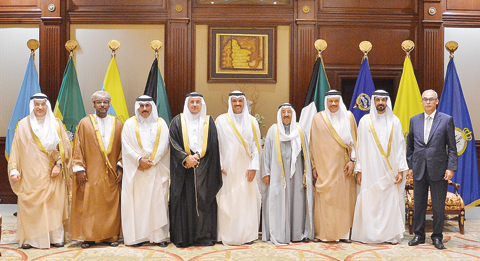Hashel calls for cautious response to challenges - Zayani urges banking coordination
 KUWAIT: HH the Amir Sheikh Sabah Al-Ahmad Al-Jaber Al-Sabah receives Governor of the Central Bank of Kuwait Mohammad Al-Hashel, GCC Secretary General Abdullatif Al-Zayani and governors of GCC central banks and monetary institutions at Bayan Palace yesterday. — KUNA
KUWAIT: HH the Amir Sheikh Sabah Al-Ahmad Al-Jaber Al-Sabah receives Governor of the Central Bank of Kuwait Mohammad Al-Hashel, GCC Secretary General Abdullatif Al-Zayani and governors of GCC central banks and monetary institutions at Bayan Palace yesterday. — KUNAKUWAIT: The Gulf Cooperation Council is setting up a company to facilitate direct money transfers among its six members. The Riyadh-based Gulf Payments Company will allow Gulf states to transfer money "without reliance on international currencies", Kuwait Central Bank Governor Mohammad Al-Hashel told reporters yesterday following the 69th meeting of the GCC Committee of Governors of Monetary Agencies and Central Banks.
The chief executive officer has been picked and all member states have agreed to contribute initial capital, Hashel said. "After that the company has to go out and borrow from the Gulf market or use the capital it has generated," he said. The countries' central bank governors will sit on the board and a secondary office will be set up in the United Arab Emirates, he said, without saying when the company would start operating.
Hashel said the commission members lauded the formation of the company and predicted its key role in creating safe and rapid means for financial transfers among the GCC countries. The company is being started even though GCC members Bahrain, Saudi Arabia and United Arab Emirates have been boycotting a fourth member, Qatar, since June. They accuse Qatar of supporting terrorism, a charge it has denied.
During the meeting, Hashel affirmed the necessity of Gulf countries' cautious response to challenges facing the region to ensure sustainable economic prosperity. He said these challenges and changes have become "a part of our contemporary reality". He clarified that regional changes come at the same time with huge global economic changes, adding monetary policies and openness of the Gulf region to global markets have also affected the GCC countries' economies.
Hashel affirmed the need of taking into consideration precautionary measures to predict and face these changes through studies and researches that would help in strengthening and stabilizing "our financial and monetary status". Central banks of the GCC countries must continue playing an active role toward facing these challenges through ensuring immunity of Gulf states' economies, solidifying monetary and financial stability and supporting economic and structural reforms aimed at creating economic diversification, Hashel proposed.
Hashel said strong policies depend on reducing reliance on oil resources, developing national human resources, creating an investment climate and increasing private sector participation in boosting the economy. "This meeting represents a new step towards further achievements in the field of Gulf economic, monetary and financial work," he said. Hashel also stressed the importance of the role played by the supervisory and control committee and the committee of payment and settlement systems in increasing the efficiency of banking and financial sectors and protecting them against risks, as well as enhancing their ability to face new sudden circumstances.
The conferees were graced with a meeting with HH the Amir, who gave guidance about cooperation among GCC monetary institutions and banks, Hashel said, adding that the meeting also addressed combating money laundering and funding terrorism. He revealed that a technical team was formed for exchanging financial techniques among the GCC countries.
GCC Secretary General Abdullatif Al-Zayani said financial and banking coordination and cooperation among the GCC member states are likely to help consolidate pan-GCC economic integration. They also serve the final goal of achieving economic unity of the bloc by 2025, Zayani told the meeting. The GCC Supreme Council had approved linking payment systems in member countries as a major complementary project of the GCC, Zayani added, and also tasked GCC states with establishing an independent company for GCC payments.
Zayani stressed the role of the committee for enhancing cooperation and integration among the bloc's monetary agencies and central banks, as well as abolishing difficulties and promoting performance and financial and banking procedures. The committee's tangible efforts have contributed to the development and growth of the vital financial and banking sector, pushing it to a prominent regional and international status despite the economic and political challenges the GCC states are facing, Zayani said. - Agencies










